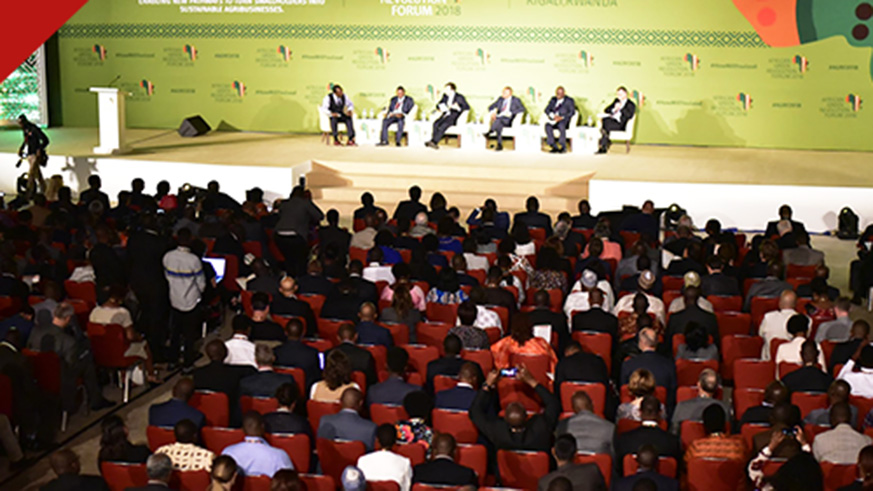

The eighth edition of the African Green Revolution Forum (AGRF) graced Kigali last week.
On a continent whose citizens still largely rely on the primitive hoe to eke out a living, such a knocking-together of heads to ponder ways of financing agriculture and in the end putting it on an industrial scale needs to graduate to implementation of the ideas generated this far.
For coming from very far, Rwanda probably needs action more urgently than most.
To illustrate how far back we are coming from and the heavy load that that puts on efforts by government to modernise agriculture, President Paul Kagame referred to a song that frequently played on the national radio in the years before 1994.
This was in a discussion during an interactive session with Ghana’s President Nana Akufo-Ado, Kenya’s Vice-President William Ruto and Gabon’s Prime Minister Emmanuel Issoze-Ngondet, moderated by former UK’s Prime Minister Tony Blair.
The song, much as President Kagame did not name its title, methinks is the one that mobilised the populace around the hoe, without failing to inexplicably inject in the pet preoccupation of the time: sawing division among Rwandans.
It went something like the following, as a friend reminded me. Forgive my clumsy translation!
"The hoe is a vital tool/Everybody should appreciate the hoe/Hero vanquisher of the hardest virgin land-piece (Rutagwabir’umushike)/[Then imagined majority ethnic group members] know how to till the land/[…minority group members] should till the land too/The white man knows how to till the land/[…forest group members] should also take to tilling the land/……”
Such a song alone shows how creating, cultivating and widening the fissures in the division campaign of the government of the day had taken centre stage. Agriculture had been relegated to the class of the minimally important, where it only received lip service.
It was no surprise then that hunger ravaged the land.
For that, the ordinary people often depended on charity organizations for American cattle-corn (yellow maize) and hardly anything else, even as they sang praises to that hoe and celebrated monopolisation of this land. A land that fed none, in spite of hard tilling labour.
Ironically, the populace was in the same boat – if not a more risky one – as the government’s disowned citizens, even as it blissfully sang praises to the government. The citizens who had been cast into the roaming life of refugees depended on yellow maize, too, but at least improvised to improve their diet.
Meanwhile, the fat-cats in the donor-funded government and in their business hangers-on led an intricately symbiotic existence. Government officials got donor funds for projects, gave some of the funds to the businesspeople to do a shoddy job of it and get their cut. Government made rosy reports and handed them to donors and everybody was happy.
After that, government officials and the business community feasted on baguette (type of bread) and champagne flowed as they caroused, with everything imported from France.
Citizens and agriculture? "Huh, whazz zaaat?”, the fat-cats in their slurred drunken stupor went a-slumbering. Theirs was to pilfer and party, as if there was no tomorrow.
Luckily, 1994 happened and for them that tomorrow wasn’t actually there!
Anyway, as a citizen when you have always depended on a small holding as your life-line, it’s near-impossible to trust any proposal for change. For others, when all your life you’ve known charity or only survived by the grace of the forest or through sheer ability to provide labour, the land becomes an object of scorn.
To the extent that it was common to find those big-wigs, as well as anybody who’d gone to school, boasting that they could not touch soil unless they fell down! In other words, they could never stoop so low as to depend on tilling the land for a living.
I believe this is the catch-22 President Kagame was referring to, when he talked about the task of changing the then prevailing mind-set.
And for changing mind-sets, nothing works miracles like actionable examples.
This is how, among many other new practices, the model villages for the underprivileged that have begun to dot the hills and valleys of this land come in. With all infrastructure put in place and all amenities available to the population, which citizen will reject such a life to cling to their small holding on a precarious precipice (amanegeka)?
Once the advantages of the model villages are impressed upon the populace, those with means will take them up like moths to light. With the financing encouragement of public-private partnership, the land will be freed up for agriculture and spur agribusiness.
But to reach that ultimate agribusiness world, Rwanda in particular and Africa generally must totally mechanise agriculture. That prized hoe of yore must be a thing of the past.
With this technology of today, reach that mechanisation stage and see how the youth will begin to bubble up with so many innovative ideas that they’ll become employment-creator giants.
Then everybody will not only wish to touch the soil – they’ll be ready to roll in it!
Which edition of the AGRF will begin to sing implementation results; the ninth, tenth…?
butapa@gmail.com
The views expressed in this article are of the author.


